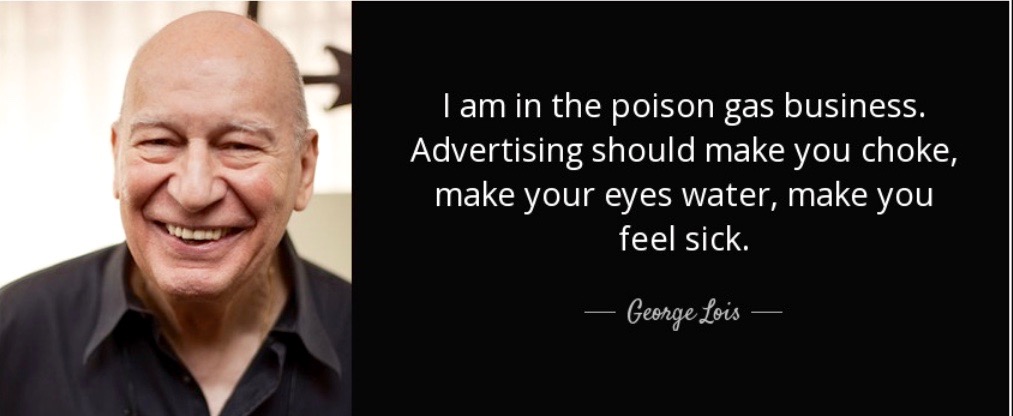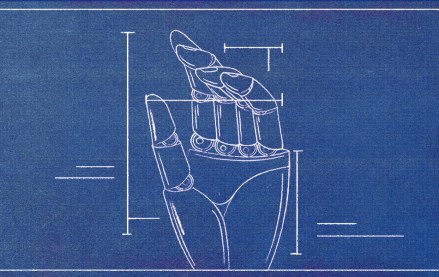
Mark Duffy has written the Copyranter blog for 11 years and is a freelancing copywriter with 25-plus years of experience. His hockey wrist shot is better than yours.
Many civilians just assume that all people who create ads are assholes, because — duh — they create ads for a living. Are they right? Sure, why not. But again, that’s not the very specific “advertising asshole” I’m about to stick my head into.
Here now, is the “advertising asshole,” presented via anecdotes. (Note: assholes are not douchebags, necessarily. An old creative director boss of mine once moved a douchebag account guy’s entire office out onto a platform in the middle of a large lake. That’s a solid advertising asshole move.)
Now, Sal DeVito, art director and co-founder of New City agency DeVito/Verdi, was (probably still is) an advertising asshole. Back in the mid 1980s, DeVito taught an ad concept course at the School of Visual Arts in New York. Each week, young men and women would bring in their handmade spec ads (this was before computers) for a certain product and tape them to the wall. And each week, DeVito would take out his lighter and torch any ads that really disgusted him.
Imagine this scenario: You’re a first-year student, and this is the first ad you’ve ever made in your life. You changed the visual three times and the headline four times. You were so proud of it. And then, poof, it’s gone. And you didn’t make a copy.
That’s an advertising asshole. But that student either got thicker skin and got better, or they realized that they just couldn’t cut it as ad creative. Would you rather have a teacher that coddled and kissed your lame ass?
George Lois, also a New York City art director, is most certainly an advertising asshole. In a 2012 interview with “Paper,” Lois said some rather unkind words about British adman Paul Arden and his book “It’s Not How Good You Are, It’s How Good You Want To Be.” Said the Bronx-born Lois, “The advice that bum gave basically teaches kids how to be phonies. I mean, if you read it, there’s about 10 things there that make you want to punch the guy out.”
Arden had been dead for four years at the time of the interview. But would you rather get advice from Lois or sit in a Kumbaya “there are no bad ideas” millennial brainstorming sess?
Lastly, we come to me. Now, I’m not putting myself in the same category as DeVito and Lois. (Well, actually, I’m pretty sure I’m better than DeVito, just not as famous.) But I am a Grade A advertising asshole. Just spend some time on my blog between 2009-2012.
Back in the 1990s, I was asked to pre-judge some awards shows. Pre-judging is no big deal, they’ll basically take any warm creative body. Pre-judging is just for getting rid of the chaff.
Once, I was pre-judging one of the more “prestigious” shows on a freezing-cold Saturday morning at 9 a.m. I was judging print with four others. If three or more killed the ad, it was out. I saw about 100 print ads, and I killed them all. I honestly didn’t like even one of them.
An “administrator” woman came up to me as I was about to judge radio and simply asked me to GTFO, which I gladly did. I wasn’t invited back the next year.
If you’re a (talented) young copywriter or art director, I beg you to veer off the nice guy/gal path and set your career course for “advertising asshole.” The creatively dying industry needs you.
More in Marketing

Best Buy, Lowe’s chief marketing officers explain why they launched new influencer programs
CMOs launched these new programs in response to the growing importance of influencers in recommending products.

Agencies create specialist units to help marketers’ solve for AI search gatekeepers
Wpromote, Kepler and Jellyfish practices aim to illuminate impact of black box LLMs’ understanding of brands search and social efforts.

What AI startup Cluely gets — and ad tech forgets — about attention
Cluely launched a narrative before it launched a tool. And somehow, it’s working.





